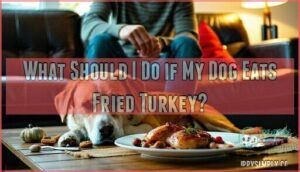This site is supported by our readers. We may earn a commission, at no cost to you, if you purchase through links.

The crispy coating creates choking hazards, while bones can splinter and cause serious internal damage.
Even plain fried turkey packs too much grease for your pup’s digestive system to handle safely. If your dog snatches some during holiday chaos, watch for vomiting, diarrhea, or lethargy.
While turkey itself isn’t toxic, the frying process transforms it into a risky treat that’s simply not worth the gamble. Better options exist that’ll keep tails wagging safely, and it’s always best to choose a safe alternative.
Table Of Contents
- Key Takeaways
- Is Fried Turkey Safe for Dogs?
- What Are The Risks of Feeding Fried Turkey to Dogs?
- Can Dogs Eat Plain, Unseasoned Fried Turkey?
- What Should I Do if My Dog Eats Fried Turkey?
- Can Dogs Eat Fried Turkey Skin?
- Can Dogs Eat Fried Turkey Bones?
- Are There Any Alternatives to Fried Turkey for Dogs?
- Can Dogs Develop Allergies to Fried Turkey?
- How Much Fried Turkey Can Dogs Safely Eat?
- What Are The Safest Ways to Feed Turkey to Dogs?
- Frequently Asked Questions (FAQs)
- Can dogs eat fried turkey?
- Can a dog eat leftover turkey meat?
- Can dogs eat raw turkey?
- Can dogs eat turkey meat without bones?
- Can dogs eat deli turkey?
- Can dogs eat turkey hot dogs?
- Why can’t dogs eat cooked turkey?
- What are the three toxic meats for dogs?
- Will turkey upset my dog’s stomach?
- Is fried meat ok for dogs?
- Conclusion
Key Takeaways
- Don’t give your dog fried turkey – the high fat content can trigger pancreatitis, a serious condition that’ll send you straight to the emergency vet with a sick pup
- Seasonings and bones are dangerous – garlic and onions are toxic to dogs, while cooked bones splinter and create choking hazards or internal injuries
- Watch for symptoms if your dog sneaks some – vomiting, diarrhea, lethargy, or abdominal pain mean you need to call your vet immediately
- Stick to plain, cooked turkey instead – remove all skin, bones, and seasonings, then offer small portions as an occasional treat that won’t put your dog’s health at risk
Is Fried Turkey Safe for Dogs?
Fried turkey poses significant fried turkey safety concerns for your dog.
The high fat content can trigger pancreatitis, affecting 1-2% of dogs annually with symptoms like vomiting and lethargy.
Seasonings often contain toxic ingredients like garlic and onions, making dogs eating fried meat particularly risky.
Regular table scraps lead to obesity, diabetes, and joint stress.
Can dogs eat turkey? Yes, but not the fried variety.
Safe feeding practices require plain, unseasoned options.
Turkey alternatives like commercial dog treats provide better canine health outcomes.
When considering turkey dog treats, choose products specifically formulated for dogs rather than sharing your holiday feast.
What Are The Risks of Feeding Fried Turkey to Dogs?
While fried turkey might smell amazing to your dog, it carries serious health risks that responsible pet owners should understand.
The high fat content, seasonings, and cooking process create multiple hazards that can lead to emergency vet visits.
High Fat Content
That turkey’s high fat content packs a dangerous punch for dogs.
One cup of fried turkey contains about 11.5 grams of fat, with turkey skin contributing up to 44 grams per serving. This oil content creates serious pancreatitis risk, especially since dogs can’t process fatty acids like humans.
Dogs require careful turkey feeding guidelines to avoid health issues.
- Fat intake limits: High-fat foods trigger pancreatitis in dogs, requiring immediate veterinary care
- Dietary limits matter: Even small portions can cause digestive upset and long-term health issues
- Fried turkey safety: The cooking method adds unnecessary fats that overwhelm canine digestive systems
Seasonings and Marinades
Beyond the high fat content that can trigger pancreatitis, seasonings and marinades pose serious threats to your dog’s health.
Common ingredients like garlic and onions cause red blood cell damage, while salt overload leads to dehydration and kidney strain.
It’s vital to think about the impact of safe dog seasonings when preparing meals for your pet.
| Toxic Ingredient | Health Risk | Symptoms |
|---|---|---|
| Garlic/Onions | Red blood cell damage | Lethargy, pale gums, weakness |
| Excess Salt | Kidney strain, dehydration | Vomiting, tremors, seizures |
| Spicy Seasonings | Digestive irritation | Drooling, stomach upset |
| Hidden Marinades | Multiple toxins | Varies by ingredients |
Even small amounts of these seasonings can cause allergic reactions and digestive issues in sensitive dogs.
Potential for Burns
Deep-frying turkey creates serious burn risks that extend beyond your dog’s potential meal.
Hot oil and eager pets don’t mix—keep your furry friend at a safe distance during frying.
The process involves extremely hot oil reaching temperatures over 350°F, creating thermal injury hazards if spilled or splattered.
According to the U.S. Consumer Product Safety Commission, pets should stay away from turkey fryers due to scalding dangers and flame risks.
Heat exposure from hot oil can cause severe burns requiring immediate veterinary attention.
Even brief contact results in painful thermal injuries.
Beyond burn risk, fried turkey often contains toxic ingredients like garlic and onions, plus presents choking hazards from bones and digestive issues from high fat content.
Keep your furry friend at a safe distance during frying operations to prevent severe burns and ensure their safety.
Can Dogs Eat Plain, Unseasoned Fried Turkey?
Plain, unseasoned fried turkey can be okay for dogs, but proceed with caution. The high fat content from frying makes pancreatitis a real concern – this painful condition affects 1-2% of dogs annually.
When considering turkey meal prep for your pup, remember that fried foods aren’t ideal for canine digestion. If you’re exploring dog food alternatives, stick to small portions without skin or bones.
Pet safety guidelines recommend limiting treats to 10% of daily calories. While dogs can eat turkey, plain unseasoned turkey that’s baked or grilled offers better fried turkey nutrition without the added risks.
Understanding fried turkey nutrition is vital for making informed decisions about your dog’s diet.
What Should I Do if My Dog Eats Fried Turkey?
After accidental consumption of fried turkey, monitor your dog closely for toxic symptoms like vomiting, diarrhea, or lethargy.
Contact your vet immediately if you notice persistent symptoms or if your dog consumed seasoned meat, bones, or large amounts.
Don’t induce vomiting without vet advice, and keep your dog hydrated and watch for signs of pancreatitis—abdominal pain and loss of appetite.
For serious canine digestive issues or breathing difficulties, seek emergency care. Quick action and professional guidance guarantee your pet’s safety when dogs eating fried meat becomes a health concern.
Can Dogs Eat Fried Turkey Skin?
Turkey skin poses the biggest threat regarding fried poultry for dogs.
That crispy turkey skin your dog craves could land you both in the emergency vet’s office.
The high-fat content in fried turkey skin can trigger pancreatitis—a serious condition affecting 1-2% of dogs annually.
You’ll want to skip this crispy temptation entirely, as dogs eating fried meat with skin face digestive upset, vomiting, and abdominal pain.
Even small amounts pack enough fat to cause trouble for sensitive stomachs, so it’s crucial to prioritize better dog food safety.
Stick to lean, skinless portions for safer canine nutrition.
Can Dogs Eat Fried Turkey Bones?
Regarding turkey bones, you’re walking into dangerous territory for your dog’s health. Fried turkey bones pose serious canine health warnings that every pet owner should understand.
Turkey bones become brittle and prone to splintering when cooked, especially when fried. These sharp fragments can cause choking, puncture your dog’s digestive tract, or create painful blockages requiring emergency surgery.
The frying process makes bones even more dangerous by hardening them further. Fried meat bones aren’t just a choking hazard—they’re a recipe for disaster.
Veterinary emergency rooms see countless cases of bone health complications during holidays when well-meaning families share table scraps. Can dogs eat turkey bones? Absolutely not.
Turkey safety experts unanimously agree: no cooked bones, period. The high-fat content from frying adds another layer of risk, potentially triggering pancreatitis alongside bone-related injuries.
For dog wellness, stick to safe chew alternatives like nylon toys or specially designed dental chews. Your canine nutrition plan should prioritize dog nutrition advice that keeps your furry friend healthy and happy.
Are There Any Alternatives to Fried Turkey for Dogs?
Smart pet-parent choices lead to happier holidays for everyone.
Instead of risky fried turkey, consider these dog-friendly safe alternatives that satisfy your pup’s cravings without the health concerns:
- Turkey plush toys – satisfy chewing instincts safely
- Homemade jerky – dehydrated plain turkey meat
- Healthy snacks – commercial turkey-flavored treats
- Safe treats – cooked pumpkin or plain boiled chicken
These alternatives provide the turkey experience dogs crave while supporting proper canine dietary restrictions and dog nutrition advice.
When selecting snacks, this is key to choose dog friendly treats that align with your dog’s nutritional needs.
Can Dogs Develop Allergies to Fried Turkey?
Yes, dogs can develop turkey allergies, though it’s relatively uncommon. Turkey allergy affects only 1-2% of dogs, making it less likely than chicken or beef sensitivities. However, canine sensitivity can develop with repeated exposure over time.
Watch for these allergic reactions after your dog consumes fried turkey:
| Skin Issues | Digestive Signs | Severity Level |
|---|---|---|
| Itchy, inflamed skin | Vomiting episodes | Mild to moderate |
| Chronic ear infections | Diarrhea or loose stool | Moderate |
| Hot spots and rashes | Excessive gas production | Mild |
| Excessive scratching | Abdominal discomfort | Moderate |
Dogs with existing poultry allergies face higher risks due to protein cross-reactivity. Food intolerance symptoms typically appear within hours of consumption. If you suspect canine dietary restrictions are needed, consult your veterinarian for proper diagnosis through elimination diets lasting 8-12 weeks.
How Much Fried Turkey Can Dogs Safely Eat?
Looking at fried turkey portions for dogs requires careful consideration of canine diet safety. Can dogs eat turkey in fried form? Yes, but with strict limits. Fried turkey should comprise no more than 10% of your dog’s daily caloric intake, making it an occasional treat rather than a regular meal component.
Fried Turkey Portions vary by dog size:
- Small dogs (11-20 lbs): Maximum 1 ounce daily
- Medium dogs (21-50 lbs): Maximum 2 ounces daily
- Large dogs (51-90 lbs): Maximum 2.5 ounces daily
- Extra-large dogs (91+ lbs): Maximum 3 ounces daily
Fried Meat Risks increase with portion size, particularly for dogs with sensitive stomachs or pancreatitis history. Turkey Safety depends on removing skin and ensuring plain preparation without seasonings that could harm your pet’s digestive system. Understanding fried turkey portions is vital for dog owners to make informed decisions about their pet’s diet.
What Are The Safest Ways to Feed Turkey to Dogs?
Beyond the basics of can dogs eat turkey, mastering safe feeding practices requires understanding proper preparation methods.
The key lies in removing all skin, bones, and seasonings before serving plain, cooked turkey meat.
Follow these turkey portion control guidelines to guarantee your dog’s safety.
| Preparation Step | Safe Method | Why It Matters |
|---|---|---|
| Remove Skin | Strip all fatty skin completely | Prevents pancreatitis from high fat content |
| Debone Thoroughly | Check for small bone fragments | Cooked bones splinter and cause choking |
| Cook Plain | No oils, seasonings, or marinades | Garlic and onions are toxic to dogs |
| Cut Small | Bite-sized pieces for dog’s size | Reduces choking risk, aids digestion |
| Limit Portions | 10% of daily calories maximum | Maintains balanced canine dietary needs |
When cooking turkey for dogs, bake or boil the meat without additives.
These healthy treat options provide essential nutrients while keeping your pup safe.
Ground turkey works well for homemade dog food recipes, offering complete proteins and essential amino acids for ideal canine nutrition tips.
Understanding the benefits of raw turkey neck nutrition is vital for making informed decisions about a dog’s diet.
Frequently Asked Questions (FAQs)
Can dogs eat fried turkey?
Don’t bite off more than you can chew.
You can give your dog small portions of plain fried turkey without skin or bones, but limit it to 10% of their daily calories to prevent pancreatitis.
This will help ensure your dog’s safety and well-being.
Can a dog eat leftover turkey meat?
Your dog can safely eat leftover turkey meat if it’s plain, unseasoned, and boneless.
Remove all skin and fat first, then offer small portions as treats—not exceeding 10% of their daily calories.
Can dogs eat raw turkey?
Like playing with fire, you’re asking about raw turkey for your pup.
Raw turkey carries serious bacterial risks including salmonella, which can make both you and your dog sick.
Always cook turkey thoroughly to 165°F before serving.
Can dogs eat turkey meat without bones?
Yes, you can safely feed your dog boneless turkey meat.
Remove all skin and seasoning first, then offer small portions as treats.
Plain, cooked turkey provides excellent protein and essential nutrients for your furry friend.
Can dogs eat deli turkey?
While technically safe, processed deli turkey isn’t your best bet for Fido’s treats.
It’s packed with sodium, preservatives, and nitrates that can upset your pup’s stomach and strain their kidneys over time.
Can dogs eat turkey hot dogs?
Turkey hot dogs aren’t ideal for your pup.
They’re packed with sodium, preservatives, and spices that can upset their stomach or cause more serious health issues.
Skip the processed meat and offer plain, cooked turkey instead.
Why can’t dogs eat cooked turkey?
Walking a tightrope between safe and dangerous, dogs can’t eat cooked turkey because bones splinter easily, causing choking and internal injuries.
The skin’s high fat content triggers pancreatitis, while seasonings like garlic prove toxic.
What are the three toxic meats for dogs?
Raw meats with bacteria pose serious risks, while processed meats like bacon, ham, and salami are toxic due to high salt, fat, and nitrates that can cause pancreatitis.
Will turkey upset my dog’s stomach?
Better safe than sorry regarding your pup’s belly! Plain turkey won’t typically upset your dog’s stomach, but fatty, seasoned, or fried turkey can cause digestive issues or pancreatitis.
Is fried meat ok for dogs?
Fried meat isn’t ideal for dogs. High fat content can trigger pancreatitis, causing vomiting and abdominal pain. You’ll want to stick with plain, lean, cooked meat instead for safer treats.
Conclusion
Consider Max, a golden retriever who grabbed a piece of seasoned fried turkey from the counter during Thanksgiving dinner.
Within hours, he was vomiting and showing signs of abdominal pain, requiring an emergency vet visit for pancreatitis treatment.
Remember, can dogs eat fried turkey isn’t just about toxicity—it’s about serious health risks.
Skip the fried variety entirely and stick to plain, cooked turkey without bones or seasonings.
Your dog’s digestive system will thank you for choosing safer alternatives.
- https://www.redcross.org/take-a-class/first-aid
- https://www.irs.gov/newsroom/irs-provides-tax-inflation-adjustments-for-tax-year-2023
- https://www.firstplaceaz.org/
- https://www.snapcalorie.com/nutrition/fried_turkey_nutrition.html
- https://www.lsuagcenter.com/portals/communications/news/news_archive/2010/december/news_you_can_use/fried-turkeys-not-necessarily-unhealthful
















